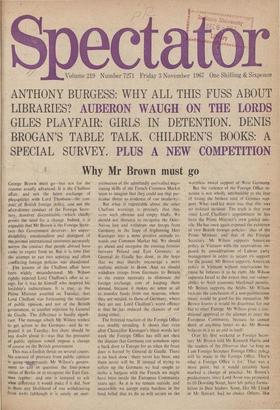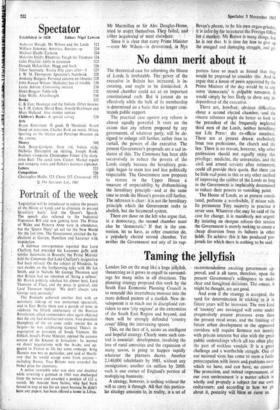Why Mr Brown must go
George Brown must go—but not for the reasons usually advanced. It is the Chalfont Affair; and -net -the latest exchange of pleasantries with Lord Thomson—the • coff- ducL of British. foreign policy. and not the after-dinner conduct of the Foreign Secre- tary, .however discreditable—which • chiefly points 'the- need for a change. Indeed, it iS arguable that Mr Brown is the Foreign Secre- tary- this Government deserves: his unpre- diehthility. emotionalism and disregard of thepormal international courtesies accurately mirror the conduct that people abroad have corrie to expect from us. But it is time that the" attempt to run two separate and often conflicting foreign policies was abandoned.
The lessons of the Chalfont affair have been- • widely misunderstood. Mr Wilson rightly rejected Lord Chalfont's offer to re- sige, for it Was he himself who inspired his lordship's indiscretions. It is: true. as the Prime Minister asserted on Tuesday. • that Lord Chalfont, Was forecasting the reaction of public opinion, and not of the British government, to another rejection by General de Gaulle. The difference is hardly signifi- cant. The message which Mr Wilson wished to .get across to the Germans—and he re- peated it on Tuesday, lest there should be any doubt about it--was that the. pressures of public opinion would impose a change of course on the British government.
This was a foolish, threat on several counts.- No amount of pressure from public opinion is going -VoRersnade Mr Wilson's govern- ment to- call in question the four-power status of Berlin or to-recognise the East Ger- num 'regime: and one is tempted to ask what difference it would make if it did. Nor is there any likelihood -of our withdrawing from. NATO (although it is surely an over- estimation of the admittedly unrivalled nego- tiating skills of the French Common Market team to imagine that they could use that par- ticular threat as evidence of our insularity).
But what is regrettable about the other Chalfont warnings is precisely that they were such obvious and :empty bluffs. We should not threaten to recognise the Oder- Neisse line and withdraw our troops from Germany in the hope of frightening Herr Kiesinger into a more pbsitive attitude to- wards our Common Market bid. We should go ahead and recognise the existing frontier between Poland and East Germany. as General de Gaulle has done, in the hope that we may thereby encourage a more realistic attitude in Bonn. And we should withdraw troops from Germany to Britain to the extent necessary to eliminate the foreign exchange cost of keeping them abroad. because it . makes nO sense at all to transfer funds from our reserves, where they are needed. to those of Germany. where they are not. Lord Chalfont's worst offence is that he has reduced the chances of our doing either.
The frenzied reaction of the Foreign Office was doubly revealing. It :shows that even after Chancellor Kiesinger's blunt words last week the Foreign Office has still not shed the illusion that Germany can somehow open a back door to Europe for us when the front door is barred by General de Gaulle. There is no back door: there never has been, and there never will be. If instead of trying to soften -up the Germans we had sought to strike a bargain with the French we might have been inside the European Community years ago. As it is we remain outside, and meanwhile we accept extra burdens in the fond. belief that to do so will secure us the worth-less moral support of West Germany. But the violence of the Foreign Office re- action is not wholly attributable to the fear of losing the broken reed of German sup- -port. What rankled most Was that this was no isolated incident. The truth is that ever since Lord Chalfont's appointment he has been the Prime Mieister's own guided mis- sile. He has once again exposed the existence of two British foreign policies : that of the Prime Minister, and that of the Foreign Secretary. Mr Wilson supports American policy in Vietnam with the reservations im- posed by considerations of Labour. party management in order to secure Lis support for the pound, Mr Brown supports American polic) in Vietnam without reservations be- cause he believes it to be right. Mr Wilson supports Israel to the extent that our vulner- ability to Arab economic blackmail permits. Mr Brown supports the Arabs.' Mr Wilson reckons the conclusion of a non-proliferation treaty would be good for his reputation. Mr Brown knows it would he disastrous for our bid to enter Europe. Mr .Wilson gives a con- ditional approval to the attempt to enter the European Community because • he cannot think of anything better to do. Mr Brown believes in it as an end in itself.: Over his first weekend as Foreign Secre- tary Mr Brown told Mr Kenneth Harris and the readers of the Observer that 'so long as I am Foreign Secretary Foreign Office policy will be made in the Foreign Office. That's. what a Foreign Office is for: That- was a. moot point. but it would certainly have marked a change of practice. Mr Brown's predecessors. since Lord Avon was promoted to 10 Downing Street, have left policy formu- lation to their leaders. Some, like Mr Lloyd or Mr Stewart, had no choice. Others, alto Mr Macmillan or Sir Alec Douglas-Home, ,tried to assert themselves. The).!- failed, and either ac4uies6d or went elsewhere.' Since it is clear that every Prime Minister —even Mr Wilson—is determined, in Nye Bevan's -phrase, to be his own organ-grinder, • it is safer by far to reserve the Foreign Office for a monkey. Mr Brown is many things, but be is not that. It is time for him to give up the unequal and damaging struggle,.and go.











































